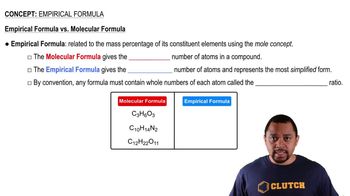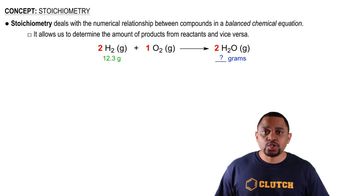Give the empirical formula of each of the following compounds if a sample contains (b) 2.10 g nickel and 0.58 g oxygen
Ch.3 - Chemical Reactions and Reaction Stoichiometry
Chapter 3, Problem 46b
Determine the empirical formula of each of the following compounds if a sample contains (b) 12.0 g calcium and 2.8 g nitrogen
 Verified step by step guidance
Verified step by step guidance1
Calculate the number of moles of calcium (Ca) by dividing the mass of calcium by its molar mass (40.08 g/mol).
Calculate the number of moles of nitrogen (N) by dividing the mass of nitrogen by its molar mass (14.01 g/mol).
Determine the simplest whole number ratio of moles of calcium to moles of nitrogen by dividing each by the smallest number of moles calculated.
Use the whole number ratio to write the empirical formula, with calcium and nitrogen subscripts corresponding to the ratio.
Verify the empirical formula by ensuring the subscripts are the smallest possible whole numbers that reflect the ratio of moles.

Verified Solution
Video duration:
1mWas this helpful?
Key Concepts
Here are the essential concepts you must grasp in order to answer the question correctly.
Empirical Formula
The empirical formula of a compound represents the simplest whole-number ratio of the elements present in that compound. It is derived from the relative amounts of each element, typically expressed in grams, and is calculated by converting these masses to moles and simplifying the ratio.
Recommended video:
Guided course

Empirical vs Molecular Formula
Molar Mass
Molar mass is the mass of one mole of a substance, usually expressed in grams per mole (g/mol). It is essential for converting the mass of an element to moles, which is a necessary step in determining the empirical formula. For example, the molar mass of calcium (Ca) is approximately 40.08 g/mol, and for nitrogen (N), it is about 14.01 g/mol.
Recommended video:
Guided course

Molar Mass Concept
Stoichiometry
Stoichiometry is the area of chemistry that deals with the quantitative relationships between the reactants and products in a chemical reaction. In the context of finding an empirical formula, stoichiometry allows us to calculate the number of moles of each element from their masses, facilitating the determination of their simplest ratio.
Recommended video:
Guided course

Stoichiometry Concept
Related Practice
Textbook Question
477
views
Textbook Question
Give the empirical formula of each of the following compounds if a sample contains (c) 26.56% K, 35.41% Cr, and 38.03% O by mass.
1450
views
Textbook Question
Determine the empirical formula of each of the following compounds if a sample contains (a) 3.92 mol C, 5.99 mol H, and 2.94 mol O
650
views
Textbook Question
Determine the empirical formula of each of the following compounds if a sample contains (c) 89.14% Au and 10.86% O by mass.
1016
views
1
rank
Textbook Question
Determine the empirical formulas of the compounds with the following compositions by mass: (a) 74.0% C, 8.7% H, and 17.3% N
501
views
Textbook Question
Determine the empirical formulas of the compounds with the following compositions by mass: (b) 57.5% Na, 40.0% O, and 2.5% H (c) 41.1% N, 11.8% H, and the remainder S
723
views
